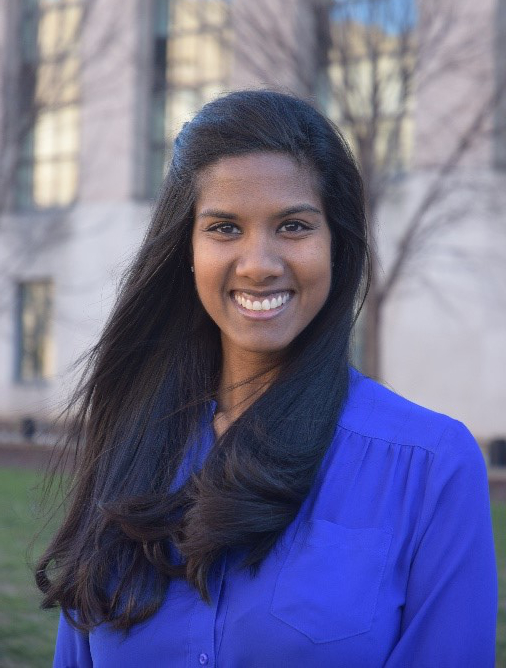JHSPH Alumni Profiles
Dr. Samantha Illangasekare
 Dr. Samantha Illangasekare graduated from The Bloomberg School of Public Health Department of Health, Behavior and Society. Prior to starting at Hopkins, Dr. Illangasekare received her MPH from Yale in Social and Behavioral Sciences and a BA from Stanford in Human Biology. After defending her doctoral dissertation, she worked as a post-doctoral research fellow at the Johns Hopkins Urban Health Institute, and then as an Assistant Scientist in the Department of Population, Family, and Reproductive Health. Dr. Illangasekare then began her work at the Office of Planning, Research and Evaluation (OPRE) in the Administration for Children and Families (ACF) at the U.S. Department of Health and Human Services (HHS) as a Social Science Research Analyst. Currently, she is still at OPRE as a Senior Social Science Research Analyst and Team Lead for Healthy Marriage and Responsible Fatherhood Research in Washington, DC.
Dr. Samantha Illangasekare graduated from The Bloomberg School of Public Health Department of Health, Behavior and Society. Prior to starting at Hopkins, Dr. Illangasekare received her MPH from Yale in Social and Behavioral Sciences and a BA from Stanford in Human Biology. After defending her doctoral dissertation, she worked as a post-doctoral research fellow at the Johns Hopkins Urban Health Institute, and then as an Assistant Scientist in the Department of Population, Family, and Reproductive Health. Dr. Illangasekare then began her work at the Office of Planning, Research and Evaluation (OPRE) in the Administration for Children and Families (ACF) at the U.S. Department of Health and Human Services (HHS) as a Social Science Research Analyst. Currently, she is still at OPRE as a Senior Social Science Research Analyst and Team Lead for Healthy Marriage and Responsible Fatherhood Research in Washington, DC.
In my role as a Senior Social Science Research Analyst at OPRE, I oversee a portfolio of research and evaluation projects related to human services programs administered by ACF. ACF’s programs aim to promote the economic and social well-being of children, families, individuals, and communities, and OPRE’s mission is to build and disseminate knowledge about effective approaches to achieving those goals. Essentially, OPRE sponsors and oversees research and evaluation studies to better understand ACF programs and determine if and how they are effective at making peoples’ lives better! Ideally, policy makers would use our research and evaluation findings to make evidence-based policy decisions.
My portfolio includes research on the Healthy Marriage and Responsible Fatherhood (HMRF) grant program and research on Family Violence Prevention Services Act (FVPSA) programs.
Broadly, my responsibilities are to:
- develop research questions and approaches to answer those questions (in collaboration with partners and stakeholders),
- conceptualize and write requests for proposals to execute research/evaluation studies to answer the questions,
- engage in the process to award contracts to execute the research/evaluation studies
- work closely with and monitor the chosen contractor to conduct the research/evaluation studies on behalf of the government
- review and shepherd dissemination products for publication to communicate our findings to the scientific community, policy makers, and the public
I am also our Team Lead for Healthy Marriage and Responsible Fatherhood (HMRF) Research and Evaluation. In this role, I coordinate a team of colleagues in my office to conduct research on ACF’s HMRF grant program. I manage our research budget and serve as the main liaison to our partners on ACF’s Office of Family Assistance, which administers the HMRF grant program.
It was a big transition for me, but wasn’t difficult because I ended up being so happy in my position. That being said, I think there were two things that were the biggest adjustments for me. First was work schedule expectations and flexibility. In academia, you are typically much more in control of your work schedule, which can be flexible. However, there are really no “off hours” – I was always working on or thinking about working on papers or writing grants, even on the evenings and weekends. In my government position, I am expected to work exactly 40 hours a week, and my schedule is entered into a very official government tracking system. But, I can typically “turn off” in the evenings and on the weekends (with some exceptions).
The second big adjustment was to the nature of my role in research. Even though I am still “doing research” in my government job, I have a more big picture role. I’m not actually conducting the research (i.e., creating surveys, conducting interviews, analyzing data) myself. Rather, I’m conceptualizing projects, awarding contracts to execute those projects, and then working very closely with the contractors who are actually doing the research. So it’s much more of a managing role.
Since entering my MPH program at Yale, I was always planning on a career in academia and never considered a career in government. Honestly, I never thought of this sector as an option for someone who was interested in research, even though academics know very well that so much research is funded by and comes out of the federal government! I think my move from academia to research was heavily influenced by my post-doc at the Johns Hopkins Urban Health Institute. My focus there was on community-engaged research and I did much of my work directly with the East Baltimore community. This made me want to continue to conduct research that was heavily focused on practice and application. OPRE’s work does exactly this – our goal is to develop evidence for the explicit purpose of improving ACF’s programs and services and helping policy makers make evidence-based policy decisions.
I found this position by searching on a job posting site (e.g., Monster, Indeed, etc.)! The job I originally got when I started working at OPRE was actually as a contractor to OPRE. The job posting was for a contract social science research analyst to work at OPRE in the same role as I described above (so my official employer was a contracting firm, and not the federal government, but my job responsibilities were very similar and I was in residence at OPRE). But then after about 8 months, I applied for and got a federal position at OPRE (which was posted on www.usajobs.gov).
If you are interested in a similar career in government, I suggest looking for fellowships or internship opportunities within government. This will give you a great sense of what the work really entails and can give you useful experience that can make you even more qualified for a permanent federal position. Some good examples are the Society for Research in Child Development Federal Policy Fellowship and the Presidential Management Fellows Program.
I also suggest looking at research positions at public or private research firms outside of academia (some examples OPRE has contracted with in the past include Mathematica, MDRC, Child Trends, Abt Associates, RTI, Westat, RAND). This will give you a sense of the type of policy-focused research that government agencies like ACF sponsors, and will give you experience in conducting this type of research.
Government salaries for positions in Washington, DC that are on the GS payscale are all publically available here. Typically at OPRE, someone at a masters or doctoral level can qualify for a GS-13 position ($97K - $126K) or GS-14 position ($115K - $149K)
As a government employee, I have a matched contribution into the Thrift Savings Plan (TSP), and I accrue 4-6 hours of annual leave and 4 hours of sick leave per biweekly pay period. I also have access to health, dental, and vision benefits. Finally, I have access to telework and Alternative Work Schedule options to increase my schedule flexibility and help maintain a good work-life balance!
For someone interested in a research-related job in the federal government, I suggest looking in a range of agencies and departments within and beyond HHS (e.g., ASPE, NIH, CDC, HRSA, NIJ, etc.). As I mentioned earlier, I got into this role first as a contractor, so I recommend looking for contracting jobs that can help you gain entry into working for the government as well. I also suggest looking at research positions at research firms that contract with the government to conduct research (for example, Mathematica, RAND, RTI, Child Trends, MDRC, etc.). This would give you exposure to the type of research that the government sponsors.
Thank you again to Dr. Samantha Illangesekare for her time in conducting this informational interview.
This interview was conducted by Julie Nadel, PhD, in collaboration with the Professional Development and Careers Office at the Johns Hopkins School of Medicine.
Current students: if you are interested in connecting with Dr. Illangesekare or other alumni for your own career exploration, please contact: phd_recruit@jhmi.edu.
Alumni: If you are willing to be contacted by a current student for an informational interview to have a profile made about your career path, please contact: phd_recruit@jhmi.edu.
